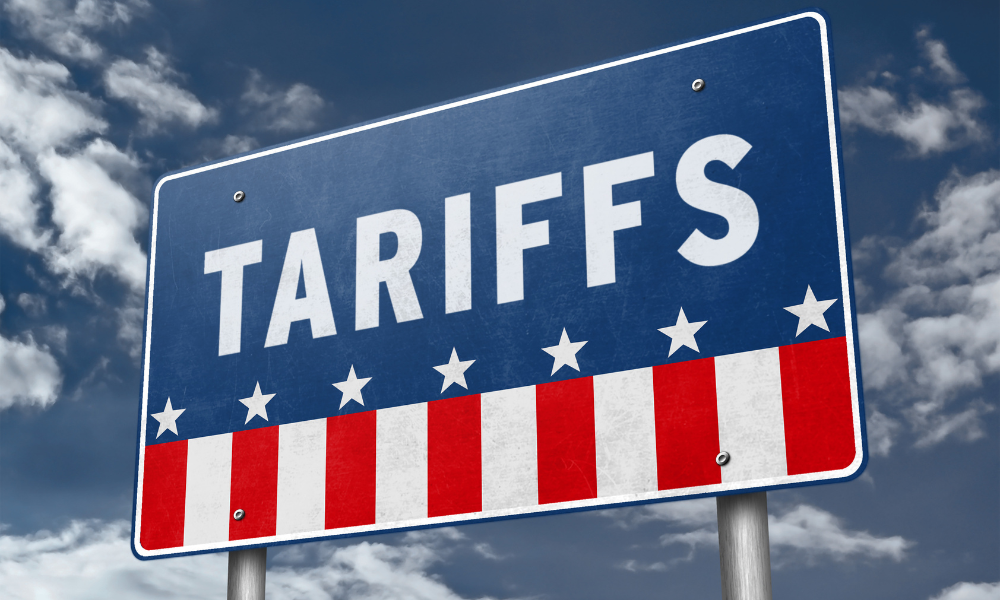Canada avoids 10% US tariff but faces auto and metals duties as Carney promises to hit back with force

On Wednesday, April 2, US President Donald Trump announced sweeping reciprocal tariffs, triggering wide-ranging political and economic responses.
According to BNN Bloomberg, Canada escaped the baseline 10 percent tariff, but other levies remain in effect or are set to begin.
Auto tariffs confirmed, Canadian exemption conditional
Trump confirmed a 25 percent tariff on all foreign-made automobiles will take effect at midnight.
Canadian vehicles will be temporarily exempt, pending the development of a process to tax only non-American components of CUSMA-compliant vehicles.
Tariffs also remain on non-compliant CUSMA goods, steel, and aluminum, originally imposed on March 12.
According to a White House fact sheet released in the late afternoon, Canada is not included in the baseline 10 percent import tariff. However, the country still faces a 25 percent duty on autos and a 10 percent levy on certain CUSMA-linked energy and potash products.
Prime Minister Carney prepares retaliatory action
Speaking Wednesday evening, Prime Minister Mark Carney stated that Canada will respond with countermeasures to remaining US tariffs.
“It’s essential to act with purpose and with force and that’s what we’ll do,” he said, referencing potential duties on pharmaceuticals, lumber and semiconductors.
Carney made the comments before meeting his cabinet and Canada-US Relations Council. He has suspended his federal campaign to focus on the trade dispute.
Government sources indicated that Canada was not given prior notice of targeted sectors, and Carney may delay an official response to assess retaliatory strategy.
US Senate votes to block Canada tariffs
Hours after the tariffs were unveiled, the US Senate passed a resolution aiming to end Trump’s emergency powers used to justify tariffs on Canada.
Passed by a 51–48 vote, the measure received support from four Republican senators: Lisa Murkowski, Susan Collins, Mitch McConnell and Rand Paul.
Though the bill faces little chance in the Republican-controlled House and would not be signed by Trump, it marks a rare rebuke of his tariff policy.
Earlier in the day, US Senator Rand Paul had called the tariffs “unconstitutional,” stating they amounted to a tax that must originate in Congress.
Industry leaders express concern over lasting impacts
Canadian industry leaders voiced deep concern. In New Brunswick, forestry groups warned that a 25 percent tariff could drive down already low wood prices, potentially putting many private woodlot owners out of business.
An earlier joint statement estimated that 24,000 New Brunswickers work in forestry, with 80 percent of output exported to the US.
In Quebec’s Saguenay region, which produces a third of the country’s aluminum, residents expressed anxiety about the March tariffs and the possibility of further duties.
“I don’t know what will happen, I worry about my grandchildren,” said retired mechanic Marcel Tremblay.
Survey shows tariff exposure across sectors
A new survey from PwC Canada released Wednesday afternoon found that 97 percent of firms in the manufacturing and automotive sectors report exposure to US tariffs.
Among them, 19 percent are considering relocating production to the US, a figure that increases to 37 percent for automotive firms.
Michael Dobner of PwC said the results align with internal expectations, noting that while few are moving immediately, many are assessing worst-case relocation scenarios to avoid further business risk.
Steelworkers already impacted; oil and market prices volatile
The United Steelworkers union reported 350 job losses following March’s steel and aluminum tariffs.
John Catto of Local 5328 said many employers are shifting product focus and could face further losses.
In Alberta, Western Canadian Select traded at its narrowest discount to West Texas Intermediate since 2021, offering short-term price stability for Canadian crude despite escalating trade tensions.
The tariff situation poses challenges for US Midwest refiners dependent on Canadian oil.
Market reactions were volatile throughout the day.
The S&P/TSX closed 273.90 points higher at 25,307.18. In the US, the Dow rose 235.36 points and the Nasdaq added 151.16, after rebounding from earlier losses.
Mixed political responses in Canada and the US
Carney told reporters Canada would not let domestic producers be disadvantaged. “There are measures we can take that at a minimum, level the playing field with the United States,” he said.
Conservative Leader Pierre Poilievre laid out a three-phase plan for Canada's trade response: targeted tariffs, economic support for affected businesses, and renegotiation of a new trade deal.
“Canada will never be the 51st state,” he said.
NDP Leader Jagmeet Singh pledged expanded EI benefits and infrastructure investments to offset job losses, and promised to protect Canadian sectors under a “no-trade clause” approach.
Ontario Premier Doug Ford, speaking to US media, argued that Trump’s tariffs would harm Americans and increase prices on homes, vehicles and pharmaceuticals. “We’d be willing to take [our tariffs] off tomorrow, if he took all the tariffs off,” he said.
Cross-border tourism, agriculture affected
The head of Visit Buffalo Niagara said Canadian visits dropped 14 percent in February, warning that March data may show a similar trend.
The Canola Council of Canada also raised concerns, stating that canola exports face dual pressure from US and Chinese tariffs, threatening $12.6bn in annual trade.
Trump defends tariffs as ‘economic independence’
In his Rose Garden speech, Trump displayed a chart outlining new tariff rates by country: 34 percent on China, 32 percent on Taiwan, 25 percent on South Korea, and others ranging between 10 and 49 percent.
He described the tariffs as a declaration of “economic independence,” saying, “Taxpayers have been ripped off for more than 50 years.”
Trump said countries “that treat us badly” would now face reciprocal fees equal to approximately half the tariffs they place on US goods.
In early morning social media posts, he called out Republican senators opposing his Canada tariffs and reiterated unsubstantiated claims linking them to fentanyl distribution.



